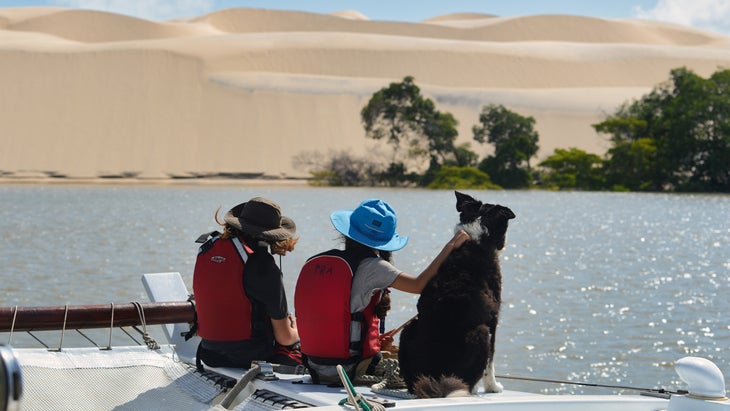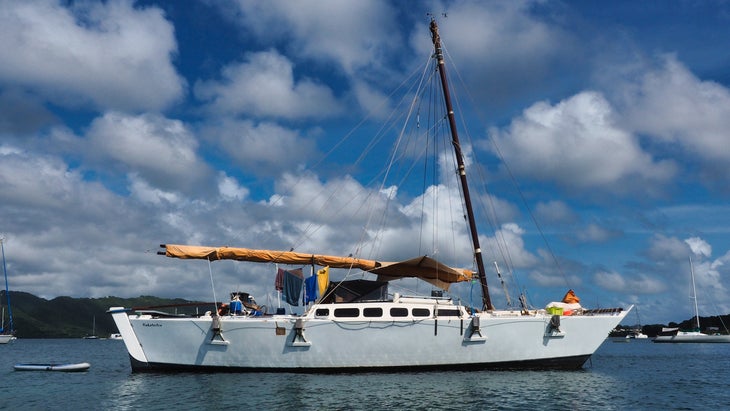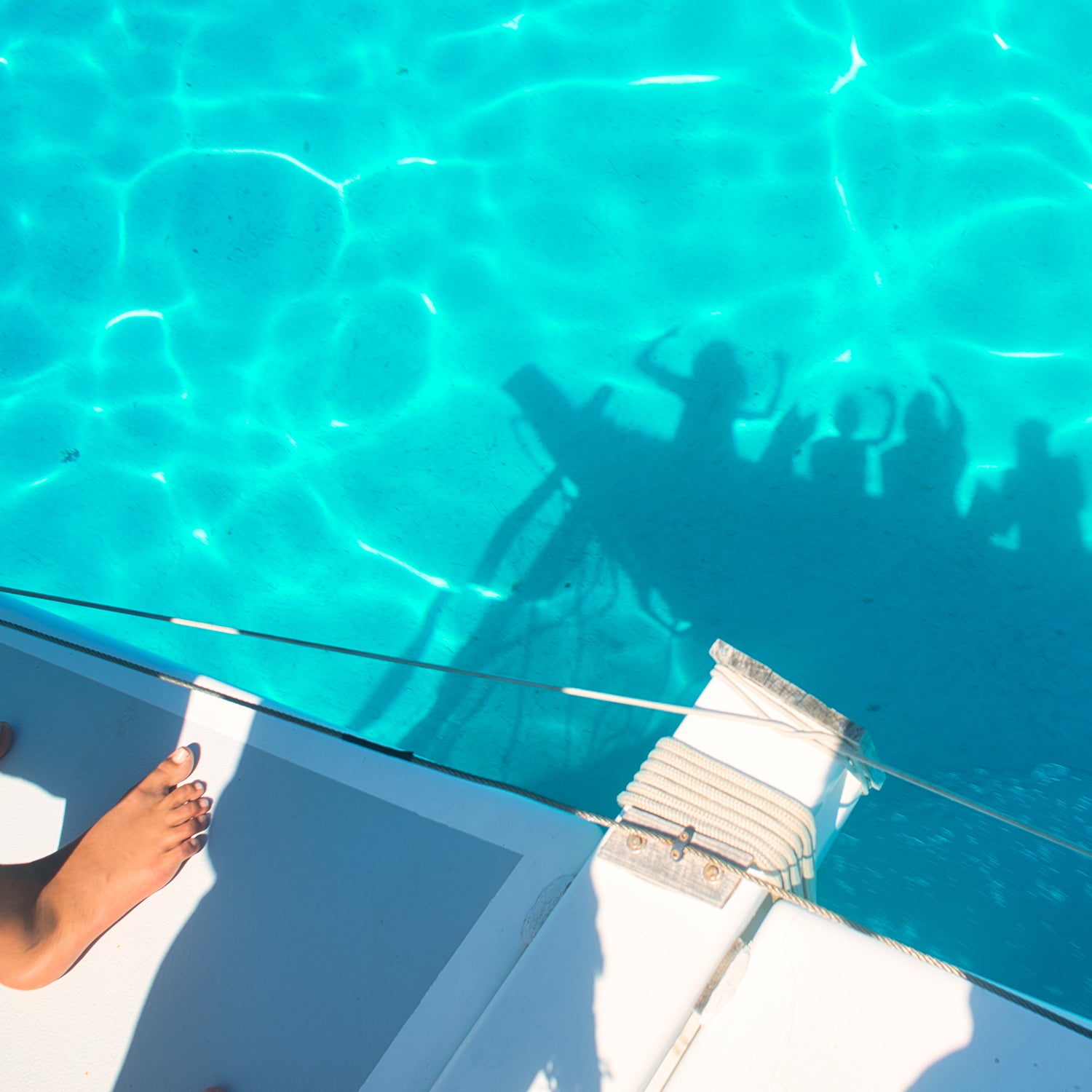A few years ago, I left my Seattle home of 15 years and flew to Recife, Brazil, to live on a 46-foot Polynesian-style catamaran with my husband, Michael; our children Enzo, 10, and Francesca, 8; and our dog, Molly. We would make Wakataitea our home for one year and sail her from South America to the Bahamas.
This was a dream Michael and I shared and worked toward. I’d seen another family living on a sailboat a long time ago, and they looked like the kind of family I wanted to have. At home, I missed travel, adventure, and hearing a language other than my own, and I wanted my children to experience these things, too.
In the children’s book Sarah, Plain and Tall, by Patricia MacLachlan, the protagonist, Sarah Elisabeth Wheaton responds to a newspaper advertisement for a wife. She moves from an oceanside village in Maine to a place far from the sea, in the Midwest. She marries Jacob Witting and cares for his two motherless children. Sarah learns to love her new family and new life. But she misses the salty air, the seals, the gulls, her brother, William, and his gray and white boat, Kittiwake. Her neighbor and friend Maggie consoles her. “There are always things to miss,” she says. “No matter where you are.”
When you set off to chase a dream, you can’t know ahead of time what you’ll miss. I missed friends and family and the comfort and stability of home, as I expected. But I also missed much more than I could ever have anticipated. And in the end, it was the steady companion of the dream itself that I missed the most.

When we moved onto Wakataitea, the boat was anchored in the Paraíba do Norte river, a sleeve of protected water behind Brazil’s coastal city of João Pessoa. There, I missed cool air—I craved the movement of any air. At the local Marina Jacaré, I missed feeling clean and fresh after a shower, because my body never stopped sweating. I missed showering without flip-flops. I missed knowing how to live my life, yet I took the helm as if I did. I missed the friends who helped us pack up our Seattle home. I missed my sister, Vanessa, who was mourning our departure and the loss of her dog. And I already missed the life I had been so eager to leave.
After 1,700 miles of offshore sailing north, we reached Suriname—South America’s smallest sovereign state, nestled between Brazil, Guyana, and French Guiana. There, I missed Portuguese; my ears never reconciled the sound of Dutch so far from the Netherlands. I missed the familiarity of Brazil, which initially had seemed so foreign. I had to let go of the possibility that we could still call the whole thing off. If I can get through this, I thought, I can get through anything. Vanessa and her husband, Simon, flew to the capital city of Paramaribo to sail the next leg with us. When I met them at Johan Adolf Pengel International Airport, dressed in crisp summer wear, I realized how much I missed clean clothes.
In Tobago, our first Caribbean island, 100 miles off the coast of Venezuela, I felt the absence of half my crew. Michael, Simon, and Enzo were sailing the boat from Suriname without Vanessa, Francesca, and me, because I needed a break; we flew to Tobago instead. In the village of Charlotteville, at the seaside cottage we rented while awaiting the boat, I missed feeling badass. I missed our anchorage in the muddy Suriname River. I missed getting to know a destination that most people couldn’t place on a map (including me, until we sailed there). I missed telling friends back home that there were piranhas and crocodiles in the water and monkeys and sloths in the trees; and that a synagogue and a mosque shared a parking lot; and that people from every period in Suriname’s history shared the streets: Caribs and Arawaks, colonial Dutch, Maroons (descendants of escaped African slaves), Suriname Creoles, and descendants of laborers from India, China, and Java. I missed Gaby, the Dutch friend we made in the riverside town of Domburg after our boat bumped into his one night. And I missed feeling like a sailor.
When Wakataitea sailed into Charlotteville’s Man o’ War Bay, I moved back onboard. The reprieve was over. I missed the cottage’s starched bedsheets, the cold fridge, faucets with running water, the toaster, and the wooden chairs surrounding the tiny table draped with a white muslin tablecloth. I missed the stillness of land. Then I missed Vanessa and Simon when they left in a taxi for Tobago’s international airport to fly home to British Columbia.
We approached the southern tip of Grenada on a starboard tack at dawn and congratulated ourselves on completing our first overnight sail without vomiting. When we saw 200 masts at anchor in the popular Prickly Bay, I missed everything that had come before. I missed the remoteness of the places less traveled by cruising sailboats. I missed morning visits to the Charlotteville Public Library—an unexpected facility in such a rural location—to homeschool Enzo and Francesca in a place where the desks didn’t sway and our pages didn’t flap in the trade-wind breeze.
We continued north, making our way up the Windward Islands. When we reached St. Anne in Martinique, I thought I’d miss nothing, because France supplied so much. We found Camembert, Comté, Cantal, freshly baked pain au chocolats and croissants. But I missed the joy of the Grenadians and the buses that throbbed with soca music and too many passengers because they could always fit one more. I missed the humor, the Grenada Chocolate Company, and the local produce: soursop, cashew apples, governor’s plums, rambutans, rock figs, and water lemons.
One year became two. We lived on the cheap, stretching our savings and the rent from our house. And as time went on, I missed less and less of home.

In Dominica, I reminisced about the first time I’d sailed here, 20 years earlier, when my husband was still just a friend and ours was the only boat in Prince Rupert Bay. I missed the blanket of tropical foliage that Hurricane Maria had stripped off the island. But when we sailed three miles offshore to deep water and watched female sperm whales and their calves, I missed nothing.
In the British Virgin Islands, I missed the volcanic topography and the affordability of the other islands. I missed the sailing families we’d left behind, and their boats: Cocolo, Serena, and Pontea. After six weeks of hosting visitors from home, I missed it just being the four of us. Yet when our friends and family left, I missed sharing our boat life with those in our Seattle life. In Trellis Bay, off Beef Island, I missed my daughter; she’d found a new hero, Mün, a 26-year-old Guatemalan surfer and artist, who was awesome and wasn’t me.
Two years became three, and we set a deadline to go home. Each day in each place became the last day in that place. I missed them all already.
In the Turks and Caicos, I missed my dad, who, with his heavy Italian accent, used to call them the Tarts and Crooks. When he died, three years earlier, my life cleaved in two: the before-my-dad-died life and the after-my-dad-died life. Now, thankfully, I would have a before-Wakataitea life and an after-Wakataitea life.
In the Exuma Cays of the Bahamas, I missed every day as it moved from the present to the past. We’d sailed over 5,000 miles in a direction toward home but thousands more from the versions of ourselves we’d left behind. I missed the life we would soon leave.
In The Long Way, French sailor Bernard Moitessier wrote, “I have set course for the Pacific again … last night was too hard to take, I really felt sick at the thought of getting back to Europe. Does it make sense to head for a place knowing you will have to leave your peace behind?” Moitessier became a legend in the 1968 Sunday Times Golden Globe Race, the first nonstop, single-handed, round-the-world yacht event. After rounding South America’s Cape Horn, the race’s last major challenge, Moitessier—who was poised to win—abandoned the competition. Instead of steering north, back to Plymouth, England, he eased the sails and let the westerlies of the Southern Ocean take him once more around South Africa’s Cape of Good Hope and Australia’s Cape Leeuwin and into the Pacific; there, after ten months and 37,455 miles alone at sea, he finally stopped and settled in Tahiti.
Now we’re home in Seattle, and I sometimes forget why we came back. I miss living outside. I miss the limits that a boat imposes on resources—fresh water, power, space. I miss spending every day with my family, and I miss our work being relevant to each other. I miss the exigencies that come with living on the water and the connection that happens among fellow sailors because you need them and they need you. I miss the rhythm of dawn to dusk. I miss Enzo and Francesca’s bronzed, capable bodies. I miss the sense of purpose that comes with making bread regularly. I miss feeling excited about a glass of ice water.
After Moitessier committed to leaving his life in Europe, he wrote in his journal: “There are two terrible things for a man: not to have fulfilled his dream, and to have fulfilled it.”
Now that we have fulfilled our dream, I miss our dream.

